Empowering Women's Health: Menstrual Hygiene & Action Day
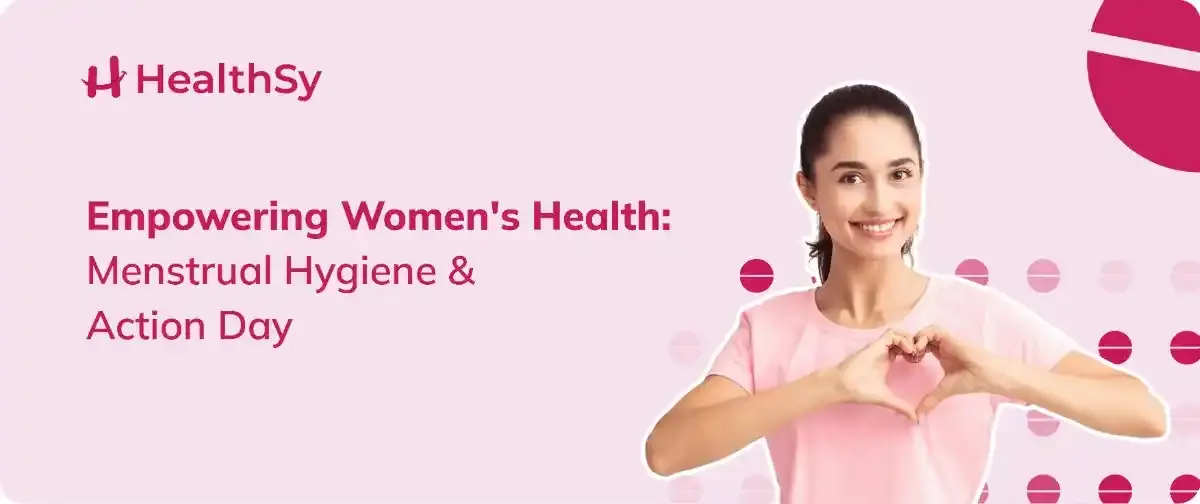
Women's health is crucial for a thriving society, and addressing information about menstrual hygiene is one of the fundamental ways to empower women worldwide. Menstrual hygiene is not just about personal cleanliness; it is also a public health issue that impacts women's health, dignity, education, and overall well-being.
Many women and girls managing their menstrual health correctly face a few challenges. A few common challenges include:
- Lack of access to good sanitary pads
- Misinformation
- Deep-rooted taboos etc
The above are a few that make it
challenging for women to control their menstrual hygiene and overall health. So, creating awareness and promoting menstrual hygiene must be prioritized in the community and policy-making.
Educating young girls and women about menstrual hygiene builds confidence and knowledge to manage them comfortably and safely. It also creates an environment where women's health is respected and acknowledged rather than stigmatized and overlooked.
Role of Education in Women's Health
Empowering women begins with education. Educating young girls in their schools and normalizing the open conversation about menstruation will help break the stigma related to menstrual hygiene. However, boys and men must also be educated about menstruation so that the women in their lives and in their society will receive the right support and help.
Community outreach programs and workshops focused on menstrual hygiene can further reinforce the importance of proper care during menstruation. These programs address the technical aspects of hygiene and touch upon women's health's emotional and psychological dimensions.
Breaking the Silence
Having transparent and open conversations about menstruation is a compelling way to improve menstrual hygiene and enhance women's health. Hopefully, the secrecy and shame around this natural process can be erased by normalizing this.
Schools, workplaces, and households must be encouraged to converse openly. Therefore, it is always recommended to shed some light on menstrual hygiene in every possible way.
International Day of Action for Women's Health
The International Day of Action for Women's Health is observed every year on May 28th. The day focuses on issues that affect women physically and mentally. It emphasizes the need to act against those issues and manage them efficiently.
Today, health professionals, educators, and activists unite to promote policy changes, share resources, and drive action. It serves as a platform to highlight the progress made and the road ahead in improving women's health worldwide.
Menstrual Hygiene Day
Menstrual Hygiene Day is observed on May 28th every year to break the silence about menstruation and raise more awareness of better menstrual hygiene. It also brings universal attention to the challenges faced by every woman during her menstrual cycle and encourages them to take collective action for better support.
This day is a call to action for governments, organizations, and individuals to invest in menstrual hygiene infrastructure, education, and product access. By doing so, we can take significant steps toward empowering women and improving women's health across all communities.
Conclusion
Empowering women is ensuring that their issues are rightly addressed so that they don't affect their lives in any way. In women's health, menstrual hygiene is indeed a cornerstone, and it must be treated with the importance it deserves. Via education, awareness, accessibility, and open conversations, we can effortlessly build a future wherein every woman can manage their overall health with confidence and dignity.

International Yoga Day is celebrated annually on June 21st as a global event dedicated to promoting mental, physical, and spiritual well-being. Starting from its commencement in 2015, this international day has gained so much importance globally. So, this year, as we approach International Yoga Day, let us get to know the theme, significance, benefits, and the reason behind the importance of celebrating this day.
International Yoga Day 2025
Indian Prime Minister Narendra Modi proposed this day in 2014, and the United Nations adopted it. This day highlights the holistic benefits of doing yoga and the various benefits that yoga brings to our body and soul. June 21st is chosen as International Yoga Day because it marks the longest day of the year (Summer Solstice) in the Northern Hemisphere, symbolizing vitality and light.
International Yoga Day 2025 Theme
Prime Minister Narendra Modi has unveiled "Yoga for One Earth, One Health" as the theme for this year's International Yoga Day, describing the global celebration as a "grand festival". This theme continues to build a unified moment that transcends and connects geographies, professions, and cultures.
Why Celebrate International Yoga Day?
Yoga is not just a physical exercise, it is a 5000-year-old practice that connects body, mind and soul. The following are the reasons why yoga is a wellness hero:
Physical Health Benefits
- Improves flexibility, strength, and posture
- Enhances cardiovascular health
- Boosts immunity and metabolism
Mental & Emotional Well-being
- Reduces stress, anxiety, and depression
- Enhance focus and mindfulness
- Promotes better sleep
Spiritual Growth
- Encourages self-awareness and inner peace
- Fosters a sense of connection with the universe
Final Thoughts
International Yoga Day 2025 is an excellent opportunity to build a healthier lifestyle. Whether you are practicing it daily or even if you are new to yoga, this day will encourage wellness, unity and mindfulness. So, make your calendars for the special day that is coming up, and take a step towards a happy and healthy life.
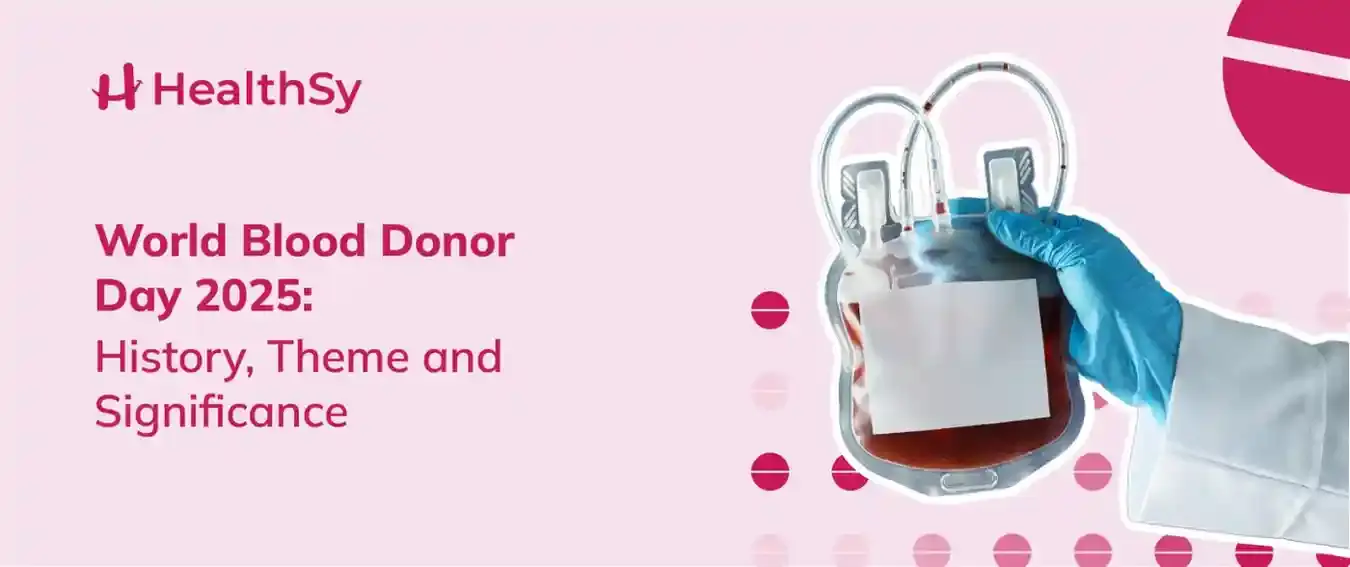
Every year on June 14th, World Blood Donor Day is observed as a global event and is dedicated to raising awareness about the importance and need for voluntary blood donations. It is a day to honor every individual who steps forward to donate blood. As we approach World Blood Donor Day 2025, let’s explore its history, theme, and significance, along with ways to participate in this life-saving cause.
World Blood Donor Day 2025 History
World Blood Donor Day was first established in 2004 by four major international organizations:
- World Health Organization (WHO)
- International Federation of Red Cross and Red Crescent Societies (IFRC)
- International Federation of Blood Donor Organizations (IFBDO)
- International Society of Blood Transfusion (ISBT)
The date, June 14th, was chosen to honor Karl Landsteiner,
the Nobel Prize-winning scientist who discovered the ABO blood group system in
1900. Since its inception, WBDD has grown into a global movement, encouraging
millions to donate blood and support healthcare systems worldwide.
World Blood Donor Day 2025 Theme
Every year, the WHO selects a theme that highlights a specific aspect of blood donation. Likewise, the theme for this year is “Give blood, give hope: together, we save lives.” This theme emphasizes:
- Awareness of the crucial need for blood and plasma donations and the impact that drives it.
- Encouragement must be given to both existing and new donors to donate blood regularly, helping to maintain a sufficient blood supply.
- Mobilization of support from the government and other development partners to organize more blood programs to gain universal access to safe blood donation and transfusion globally.
Why is Blood Donation Crucial?
Blood donation saves millions of lives every year, and here’s why it matters:
- It is crucial in emergencies, such as surgeries and accidents, as well as for any other immediate transfusions.
- Blood becomes an essential need for people with chronic conditions like thalassemia, sickle cell disease, and cancer.
- Severe bleeding during childbirth can be life-threatening without a blood supply.
- Blood is an immediate requirement for burn victims, clotting disorders, and immunocompromised patients.
With numerous advancements on the horizon and the growing
healthcare industry, there is still no artificial substitute for human blood,
which makes donors irreplaceable.
Celebrate World Blood Donor Day 2025
Every year on World Blood Donor Day, you can make a difference by:
- Donating blood
- Organizing a blood drive
- Spreading awareness
- Thanking every donor
Who can Donate Blood?
Most healthy adults are eligible to donate blood, and the following are the criteria that the donor must meet:
- Age – 18-65 years (varies by country)
- Weight – At least 50 kg (110 lbs)
- Haemoglobin Levels – Within safe range (tested before donation)
- No recent illnesses – Free from infections like flu or COVID-19
- No high-risk behaviors – As per national blood safety guidelines
Note: For further information, please consult your local blood bank.
Blood Donation: Myth and Facts
- Myth: Donating blood weakens you and is painful
- Fact: The process is entirely safe, and your body regains the amount of blood donated in a week.
- Myth: You can’t donate blood if you have high blood pressure or diabetes.
- Fact: Many people with the conditions under control can
still donate
- Myth: Blood donation takes too much time.
- Fact: The entire process takes just 30-45 minutes
The Global Impact of Blood Donation
- Every 2 seconds, someone needs blood
- One donation can save up to 3 lives
- Only 42 percent of the world’s blood supply is from voluntary blood donors (WHO)
A few countries with efficient donor programs make sure they
have better emergency response and resilience in healthcare.
Conclusion
World Blood Donor Day 2025 serves as a poignant reminder of how an act of kindness, such as donating blood, can save countless lives. Irrespective of whether you are a first-time donor or a regular donor, your efforts make a bigger difference
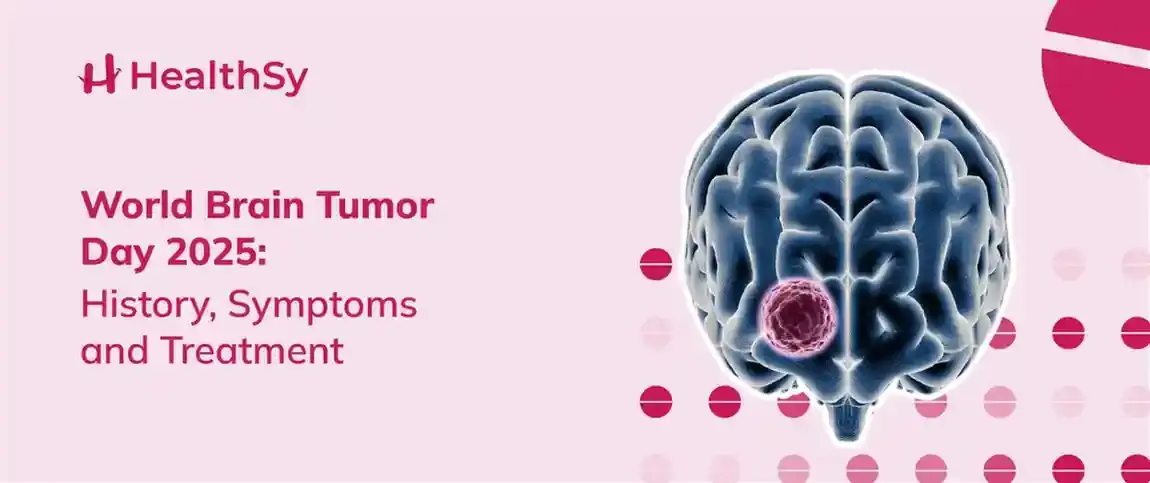
Every year on June 8th, the global community observes World Brain Tumor Day to increase awareness about brain tumors, their causes, symptoms, and treatment options. Established in 2000 by the German Brain Tumor Association (Deutsche Hirntumorhilfe e.V.), this day reminds people of the challenges faced by those affected and the importance of early detection and effective treatment.
Understanding Brain Tumors
A brain tumor is an abnormal growth of cells within the brain or in its surroundings. These types of tumors could be non-cancerous (Benign) or cancerous (Malignant), and their effects vary based on their location, size, and growth rate. Understanding the symptoms of brain tumors is very important for timely intervention.
Tumor Symptoms in the Brain
Identifying the tumor symptoms in the brain as soon as possible will help in prompt diagnosis and better patient outcomes. A common symptom of brain tumors is:
- Nausea and vomiting
- Severe and persistent headache
- Vision problems
- Seizures
- Personality and cognitive changes
- Motor skill impairments
- Difficulty in speaking
These brain tumor symptoms can
vary depending on the individual’s body conditions, the size of the tumor, etc.
Brain Tumor Causes
Brain tumors in various people can be caused by the following:
- Genetic and hereditary factors
- Radiation exposure
- Occupational and environmental exposures
- Viral infections, etc
Brain Tumor Treatment Options
The treatments and advancements in treating brain tumors are vast and still emerging daily. The treatments for patients depend on the severity of the cancer, type, location, and the patient's health. A few key brain tumor treatments include:
- Radiation therapy
- Chemotherapy
- Targeted therapy
- Surgery
- Clinical trials
- Tumor treating fields (TTF)
World Brain Tumor Day Theme
The World Brain Tumor Day 2025 theme has not yet been announced and will be updated shortly.
Whom to Consult for Brain Tumor?
Treating brain tumor involves multiple specializations. They include:
- Primary Care Physician or Neurologist: They will help you get the condition diagnosed and will direct you to tests like scans and will refer you to specialist if there is brain tumor suspected.
- Medical and Radiation Oncologist: They specialize in treating cancer with medications and radiation therapy.
- Neurosurgeon: If there is a need for a surgery in the treatment plan, there will be a role of neurosurgeon.
World Brain Tumor Day Significance
The purpose of World Brain Tumor Day 2025 is numerous; a few are:
- Awareness: Making people aware of the tumor symptoms in the brain will help in early detection and diagnosis.
- Research and Advocacy: More funding and participation in research to improve treatment options and advancements will drive more hope for a future without brain tumors.
- Support: Shedding some light on the need for psychological and emotional support to the affected people and families.
Recent Advancements in Brain Tumor Treatments
A few innovations in brain tumor treatments are as follows:
- Laser interstitial thermal therapy (LIIT)
- Proton Therapy
- Nanopore Sequencing
These advancements and
innovations provide effective and less invasive brain tumor treatment options.
Conclusion
On World Brain Tumor Day 2025, let’s commit to understanding and fighting brain tumors. By knowing more about brain tumor symptoms and staying informed about the emerging advancements in brain tumor treatments, we can undoubtedly fight tumors better. Early diagnosis, awareness, research, and support will improve progress and patient outcomes.
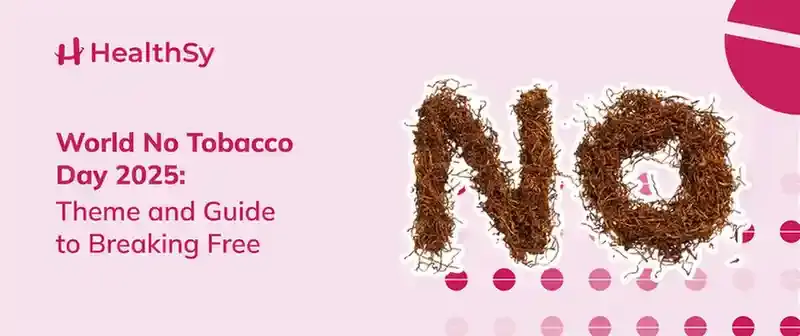
World No Tobacco Day 2025 is observed on 31st May every year as a global initiative to drive more awareness of the dangers tobacco poses to individuals’ health and to advocate for the right policies to decrease tobacco consumption globally. However, this year’s campaign highlights the tactics and attractive strategies used by the tobacco industry to market their products and how they can be brought into the light for the public to know and stay aware of.
World No Tobacco Day 2025 Theme: Unmasking the Appeal
The World No Tobacco Day 2025 theme, “Unmasking the Appeal,” aims to illuminate the deceptive strategies employed by tobacco and nicotine companies. These industries often use appealing flavors, sleek product designs, and targeted advertising to make their harmful products attractive, especially to younger demographics.
By exposing these tactics, World No Tobacco Day 2025 seeks to empower individuals and communities to resist the allure of tobacco and nicotine products and to advocate for stricter regulations that protect public health.
The Global Impact of Using Tobacco
Usage of tobacco globally remains the primary cause of various severe health conditions and deaths all over the world. According to a WHO report, more than 8 million people die due to the use of tobacco and tobacco-related illnesses, along with 1.2 million deaths due to secondhand smoke.
This World No Tobacco Day emphasizes the immediate need for action and the need to make people aware of the danger that tobacco can cause in one’s life, particularly among youngsters.
Steps to Break Free from Tobacco
Staying away from tobacco or quitting tobacco can be challenging, but the proper actions and support with resources will make it achievable. The following are a few steps to help individuals overcome the challenges of breaking free from tobacco:
- Stay more active than usual
- Keep yourself distracted
- Seek support for the required
- Find better replacements for tobacco
- Avoid triggers
- Set a date to quit
- Celebrate the milestones
Community and Call to Action
Beyond the efforts of individuals, World Tobacco Day 2025 encourages policymakers and communities to act by:
- Implementing stronger regulations
- Supporting cessation programs
- Educating the public
- Protect youth from exposure to tobacco
Things fall into place only through the united efforts of the communities, individuals, and policy levels. It is essential to educate your kith and kin so that there will be a future without tobacco.
Conclusion
World No Tobacco Day 2025 highlights the role of communities, organizations, governments, and individuals in confronting tobacco use. By exposing the dangers of tobacco use and tobacco-related products, there is more hope that fewer people will be affected by it. Also, it helps people who are used to tobacco make informed choices about quitting.
Breathe Healthy, Live Happy!
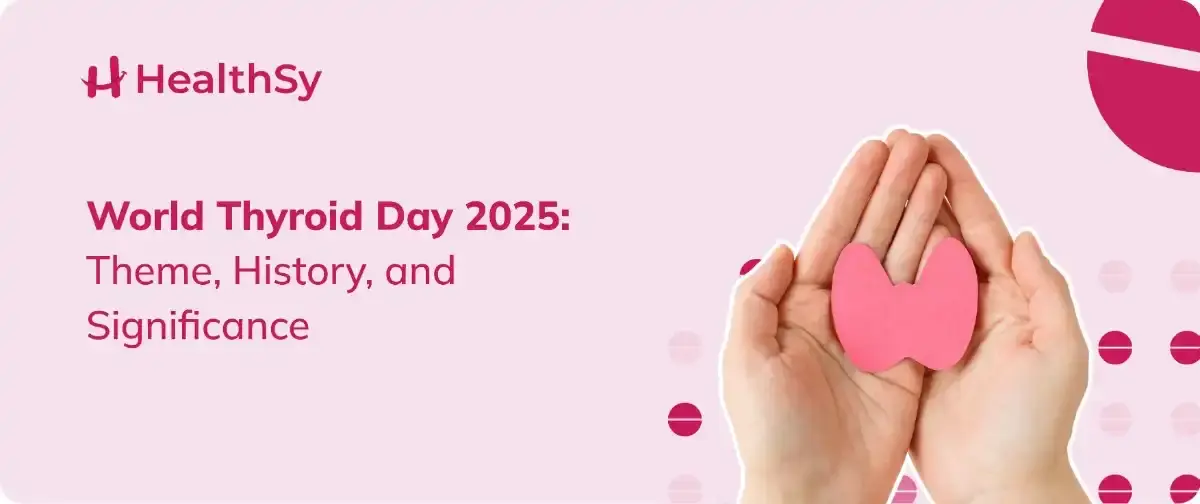
World Thyroid Day 2025 is observed every year on May 25th and is dedicated to increasing awareness about thyroid and thyroid-related conditions. This day promotes more early diagnosis, choosing the right treatments, and educating people about this serious condition. In this blog, let us shed some light on the information that is often overlooked by people globally about this condition.
World Thyroid Day 2025 Theme
The theme of World Thyroid Day 2025 has not yet been announced. Every year, the theme is predominantly focused on raising awareness about thyroid conditions and promoting global health and wellness.
World Thyroid Day History
World Thyroid Day was established in 2008 by the European Thyroid Association (ETA) and later supported by the American Thyroid Association (ATA) and other global thyroid organizations. It is observed on May 25th to raise awareness about thyroid diseases, promote early diagnosis, and highlight the importance of thyroid health worldwide.
World Thyroid Day Significance
World Thyroid Day serves as a reminder of the millions of people affected by thyroid and thyroid-related conditions, many of whom remain undiagnosed. This year, the day emphasizes:
- Public education and awareness
- Supporting individuals with thyroid conditions
- Early detection and timely treatments
- Encouragement for regular health checkups, particularly in high-risk groups like women, older adults, and individuals with a family history.
Thyroid Definition
The thyroid is a butterfly-shaped gland in the front of the neck. It produces a hormone called thyroxine (T4) and triiodothyronine (T3) that regulates body metabolism, temperature, energy levels, and more.
A healthy thyroid will ensure the proper functioning of the vital organs and the other body systems. The imbalance in this thyroid can lead to the following disorders:
- Hypothyroidism – Occurs when the thyroid gland secretes too few hormones
- Hyperthyroidism- Occurs when the thyroid gland secretes too many hormones
Thyroid Nodules, Goitre, Thyroid
Cancer – Various other thyroid conditions
Common Thyroid Symptoms
Thyroid symptoms vary based on the type of thyroid condition you may have. The following are the symptoms in detail:
Hypothyroidism Symptoms:
- Fatigue
- Weight gain
- Cold sensitivity
- Dry skin
- Depression
- Constipation
- Slow heart rate
- Puffy face
Hyperthyroidism Symptoms:
- Weight loss despite normal or increased appetite
- Rapid heartbeat or palpitations
- Nervousness or irritability
- Sweating and heat intolerance
- Tremors
- Increased bowel movements
- Menstrual irregularities
Whom to Consult for Thyroid?
If you suspect thyroid symptoms, consult your general or family physician immediately. They will help you diagnose the condition, and for more advanced treatment and decisions, they may refer you to an endocrinologist, a specialist who treats thyroid and all other hormone-related conditions.
Thyroid Causes
- Iodine deficiency
- Hormonal changes
- Certain medications
- Genetic predisposition
- Autoimmune conditions like Hashimoto’s thyroiditis and Graves’ disease, etc.
- Exposure to radiation
Final Takeaway
On this World Thyroid Day, let us join together to prioritize thyroid health and increase awareness about this small yet very concerning health condition. Regular checkups, proactive care, and a balanced diet can help you manage your thyroid and keep it healthy throughout the year.

Post A Comment